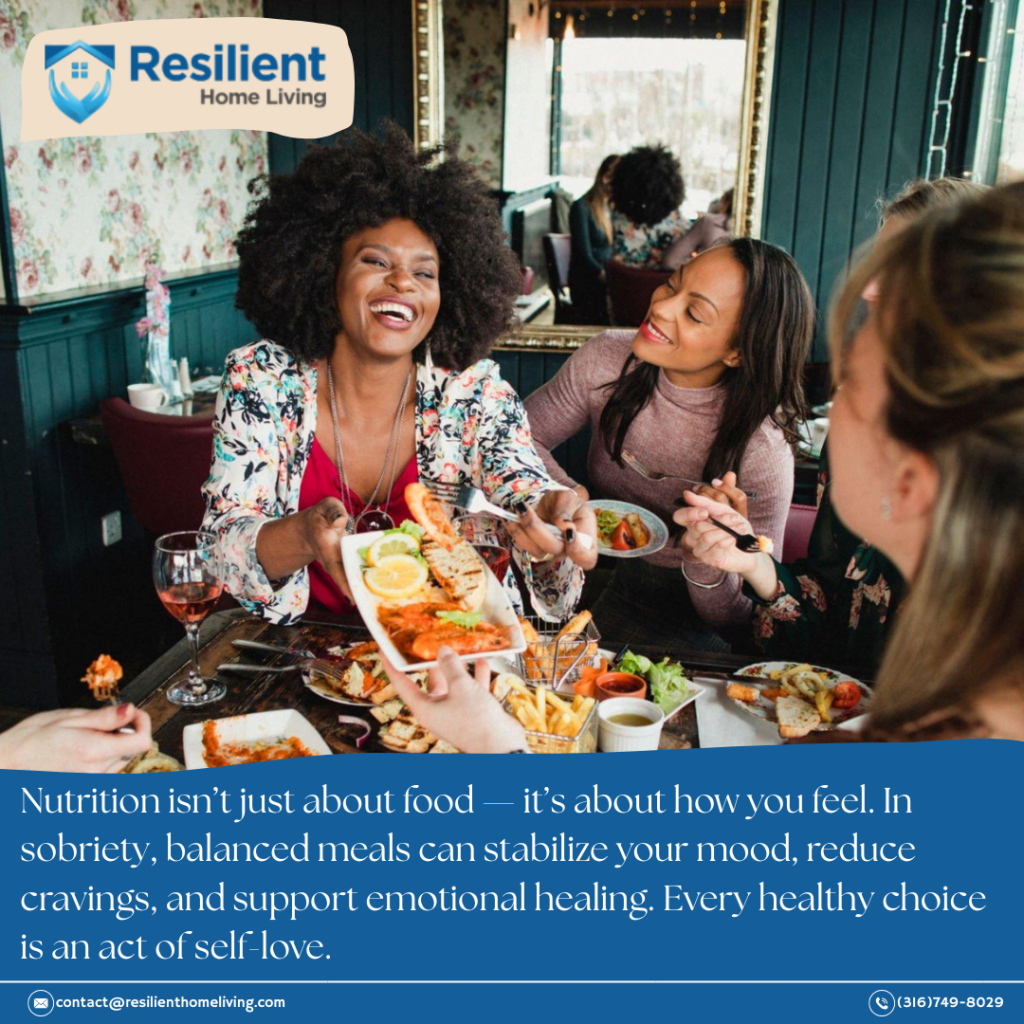Introduction
Sobriety is more than abstaining from substances — it’s about building a healthier, fuller life. One piece of recovery that often doesn’t get enough attention is nutrition. The food we eat directly affects how we feel, think, and even how resilient we are in the face of challenges.
For many people in early recovery, the body and mind are working overtime to heal. Hormones, brain chemistry, and emotional regulation need time to rebalance. The good news? What you put on your plate can either support or hinder that healing process.
By eating with intention, you can improve your mood, stabilize energy, and strengthen your recovery journey. Let’s explore how nutrition plays a vital role in emotional balance and sobriety.
🌱 The Connection Between Nutrition and Mood
Food impacts brain chemistry. For example:
- Carbohydrates help the body produce serotonin, a neurotransmitter linked to feelings of calm and happiness.
- Protein provides amino acids, the building blocks for dopamine and norepinephrine, which influence motivation and focus.
- Fats — especially omega-3s — support brain health and reduce inflammation, which is often linked to mood disorders.
When you eat balanced meals, you give your body the fuel it needs to regulate emotions, reduce stress, and feel stable. On the flip side, poor nutrition can lead to mood swings, fatigue, and even increased cravings.
🌱 Common Nutritional Challenges in Sobriety
Recovery often comes with unique challenges:
- Sugar cravings: Many people in early sobriety replace alcohol or drugs with sweets. This can lead to crashes and mood instability.
- Nutrient deficiencies: Long-term substance use often depletes vitamins and minerals like B vitamins, magnesium, and zinc — all critical for brain function.
- Digestive issues: The gut-brain connection is real, and imbalances in gut health can worsen anxiety and depression.
- Irregular eating habits: Skipping meals or relying on processed food can spike and crash blood sugar, leaving you irritable and tired.
Being mindful of these patterns helps you take back control and choose foods that truly support recovery.
🌱 Foods That Support Emotional Balance
1. Complex Carbohydrates
Whole grains, oats, brown rice, quinoa, and sweet potatoes help keep blood sugar steady and support serotonin production.
2. Lean Proteins
Chicken, turkey, fish, eggs, legumes, and beans provide amino acids for neurotransmitter production, fueling focus and energy.
3. Healthy Fats
Avocados, nuts, seeds, olive oil, and fatty fish (like salmon) support brain health and lower inflammation.
4. Fresh Fruits and Vegetables
Packed with antioxidants, vitamins, and fiber, these strengthen the immune system and promote better gut health.
5. Probiotic & Fermented Foods
Yogurt, kefir, kimchi, sauerkraut, and kombucha nurture healthy gut bacteria, which influences mood regulation.
6. Hydration
Even mild dehydration can affect mood, concentration, and energy. Aim for water throughout the day instead of caffeine or sugary drinks.
🌱 Practical Tips for Eating for Emotional Balance
- Plan Balanced Meals
Fill your plate with a mix of protein, healthy fats, and complex carbs. Think: grilled chicken, roasted veggies, and quinoa. - Snack Smart
Instead of sugary snacks, choose nuts, fruit with nut butter, or hummus with veggies. - Don’t Skip Meals
Regular eating prevents blood sugar dips that can cause irritability and cravings. - Limit Processed Sugar
Swap soda and candy for naturally sweet foods like fruit or dark chocolate in moderation. - Replenish Nutrients
Talk to a doctor about whether supplements like omega-3s, B-complex vitamins, or magnesium could help restore balance.
🌱 Emotional Benefits of Eating Well in Sobriety
- Stability: Fewer mood swings means more resilience against triggers.
- Energy: Balanced meals reduce fatigue and support productivity.
- Clarity: Good nutrition supports sharper thinking and decision-making.
- Self-respect: Choosing healthy foods reinforces self-care and builds confidence.
🌟 Final Thoughts
Sobriety is about more than avoiding substances — it’s about building a life that supports your well-being in every way. Nutrition plays a central role in how you feel, think, and show up for yourself.
By eating foods that support emotional balance, you’re not only fueling your body — you’re strengthening your recovery.

